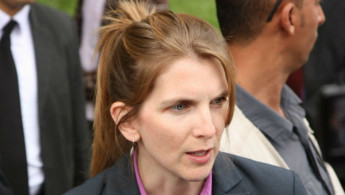Ambassador: UK embassy closure purely for security reasons
Jane Marriot, the British ambassador to Yemen, has criticised the Houthi movement's takeover of state institutions in Sanaa, as well as maintaining that her country's embassy in the capital was closed for security reasons.
In an interview with al-Araby al-Jadeed, Marriott said that the Houthis' 'constitutional declaration', an announcement on
| The political transition has been battered and bruised but it is still a road map for a better Yemen. - Jane Marriott |
February 6 that dissolved the parliament and effectively formalised Houthi control over the state, "fell short of... [the] basic concepts" of agreements signed by Yemeni political parties since the uprising against former president Ali Abdullah Saleh in 2011.
"We have discussed our position with all the groups about what we would assess as the basis for a legitimate authority in Sanaa," said Marriott.
"This includes: a governmental system reached by genuine consensus and a settlement based on the tasks of the transition as set out in the GCC [Gulf Cooperation Council] Initiative, the NDC [National Dialogue Conference] Outcomes and the Peace and National Partnership Agreement."
The UK joined the United States in closing their embassies on Wednesday, in what appears to be a coordinated move with other Western countries and GCC states. France, Germany, Italy and Saudi Arabia have pulled their staff out of Sanaa.
There has been suggestions from some quarters that the moves are designed to pressure the Houthis into making concessions with other Yemeni political groupings, but Marriott was careful to only mention security concerns when asked about the embassy closures.
“This temporary closure is because of concerns over staff safety and security... We were not prepared to operate in such an environment,” Marriott said.
“I'd very much like to see us reopen soon, but we can only do so when it is safe for our staff to return to work. In the meantime, we will continue to work internationally to help Yemen achieve a legitimate, transparent political transition in which all Yemenis are represented.”
Continued support for democracy
Marriott articulated the UK's continued support for Yemen's democratic transition, but was careful to not be seen as interfering in Yemen's internal affairs, especially in light of the anti-Western mood that exists in the country.
One of the Houthi movement's central positions is anti-Westernism, and their leader, Abdelmalek al-Houthi, has railed against perceived 'Western interference' in Yemen. The United Nations had a central role in overseeing the post-2011 transition, and many Yemenis have blamed the organisation for the country's current crisis.
“We urge all parties, including the former President [Saleh], to play a constructive role in supporting Yemen's transition and to work with the interests of Yemen as a whole in mind,” Marriott said.
She added that she thought Yemen's current political impasse was caused in part by parties not working together for the good of the country, and instead were “driven by revenge”.
Marriott also emphasised the importance of the Yemeni economy, which is on the verge of collapse. Saudi Arabia, one of Yemen's major donors, has stopped funding the economy after the Houthi entry to Sanaa in September, and there are real questions over how wages for state employees will be paid in the next month, especially with the Houthis still not being able to control oil producing areas such as Marib and Hadhramaut.
Partly blaming the Houthis for the economic crisis, Marriott urged them to resolve the issue.
“There are some good financial experts in Yemen (many currently in hiding) and access to international community advice,” she said.
“Even if some groups don't want genuine power-sharing, it is in their interests to accept it and stabilise Yemen's economy before it gets even worse for the man and woman on the street.”
Marriot, who has spent two years in Yemen, hopes to return to the country soon.
“Yemen, to me, still has the potential to be a great country. The political transition has been battered and bruised but it is still a road map to a better Yemen.”
“I hope all the political groups can do what is best for Yemen and its 27 million people and not just for themselves.”
With extra writing by Abubakr al-Shamahi



